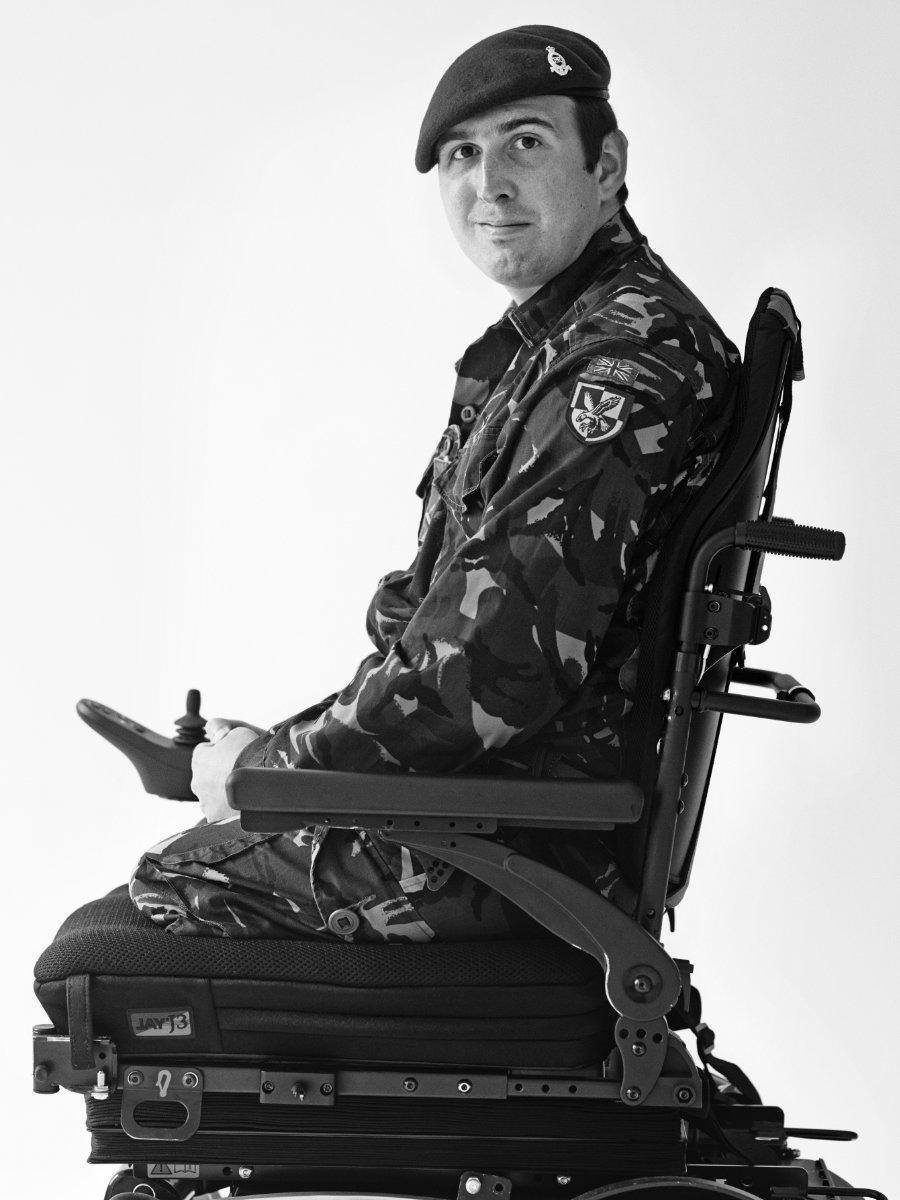
Lance Bombardier
Ben Parkinson
I went to Afghanistan in the beginning of 2006, serving with 7 Para, Royal Horse Artillery. I was in Helmand Province, where our mission was protecting the civilian population. I can’t remember anything about the day of my injury, but what happened is that I was providing flank cover in a WMIK, which is a heavily armed open-topped Land Rover. We were crossing a wadi, when a Russian anti-tank mine exploded under the rear axle. There were three of us in that vehicle. The other two walked away but I was trapped in it.
My friends from the Regiment all rushed in, even though it was a suspected minefield. They worked to give me first aid on the ground. A young team medic put a surgical airway into my trachea (to help my breathing), which was something that he’d never done before. There is absolutely no question that saved my life. The guys are very keen on saying that when the medic was in training, every time he put the surgical airway into the dummy, the dummy died. So this was actually the first time he’d ever actually achieved it. Then the Chinook came to pick me up and I was back in the field hospital in about an hour and forty minutes, before being transported back to the UK. I was actually more or less totally unconscious for four months. But I think I can remember when my son was brought to see me; he was born while I was in a coma. I was in Selly Oak for six months exactly, then I went straight to the Royal Hospital for Neuro-disability in Putney, again for exactly six months.
I lost both legs above the knee, broke my pelvis, lost my spleen, both lungs collapsed, most of my ribs were shattered, suffered fractures to several vertebrae, my cheek bones, my left arm, my skull, my jaw, all of my fingers as well as the massive injury to my brain. Only my right arm was fine. I’m still the most severely injured soldier ever to survive. The way I saw it, though, was that I had no option but to overcome my injuries. I was always convinced and determined that I would. At first, the medical staff around me thought that that was my brain injury talking and I didn’t fully understand the severity of what had happened to me. But, to me, there was no option but to overcome my injuries.
The most frustrating element of my injuries was the impact on my memory. My short- term memory is appalling and I lost my memory of four years of my life, including my deployments to Iraq and Afghanistan. It was really upsetting, because I couldn’t remember people from my Regiment; I knew I knew them, but I just couldn’t remember. With time, some aspects have come back to me, and friends have filled in some of the gaps, but it’s still difficult.
My rehabilitation is ongoing, but I’m walking on prosthetic legs, which was supposed to be impossible, and I’m talking, which was also supposed to be impossible. My voice has got better. I was on a light writer, a little synthesised voice box, for about two years. But now we don’t use that at all. People—including medical—do often make the mistake that I can’t understand anything; they’re wrong. But I just try to crack on anyway.
In terms of the support me and my family received, it absolutely was not enough. There were different agencies involved at Selly Oak, but no one had a clue what each one was doing—it was chaos. When I was injured, my Regiment were already struggling to support the families of two officers who had been killed, and they didn’t have the capacity to support me properly as well, which made things really hard for us. But they made up for it later. As for the MoD, they have no intention or wish to support anyone—and they have not made up for it since.
When a soldier gets injured, it’s not only devastating for them personally, but it has huge effects on their family. Often, they’ll have to take unpaid time off work to support the wounded guy, meaning they can lose their jobs and be unable to pay the bills. They become completely reliant on charities to help them out. There is not enough support for families. This is why me and my mum took on the compensation scheme. The amount I was initially offered by the MoD was simply not enough, given the care I’ll need for the rest of my life because of my injuries. It’s so important that soldiers and their families get the support they need and deserve.
I’m still in the Army, I act as an ambassador for my Regiment. I’m also involved with fundraising for various charities. In July 2012, me and three other amputee servicemen toured the UK in a World War II motorbike and sidecar to raise money for Pilgrim Bandits and Troop Aid. I also carried the Olympic Torch in June 2012.
One thing that I’ve also started doing is going to schools throughout the country. I talk to kids of all ages, about the challenges I face, overcoming disability, and how you have to make the most of life no matter what the obstacles. Going forward, I’d like to win Strictly Come Dancing. That, and keep my sense of humour.